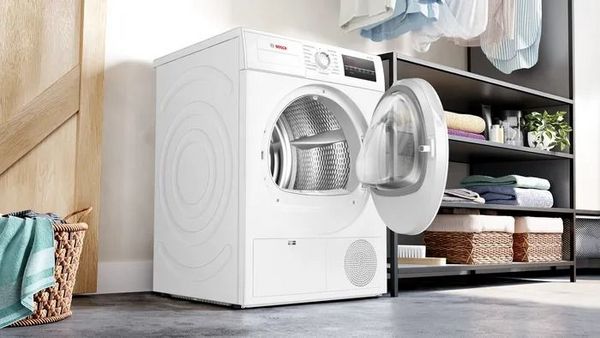
If you've been hunting for a new dryer and stumbled across the term heat pump dryer, you're not alone.
So what is a heat pump dryer exactly? It’s a ventless system that recycles hot air to dry clothes at lower temperatures, using a closed-loop heat exchange process instead of dumping hot air outside.
With energy costs on the rise and more people trying to shrink their household carbon footprints, heat pump dryers are gaining serious attention. But are they right for you?
In this post, we’ll break down how they work, compare them to condenser and vented dryers, weigh the pros and cons, walk you through installation tips, and spotlight some of the best models available now at East Coast Appliance.
How Heat Pump Dryers Work
A heat pump clothes dryer operates on a closed-loop refrigeration cycle. Here’s the short version: air is pulled in, heated, passed through the clothes, and instead of being vented outside, the moist air is cooled to remove water, then reheated and reused. That air just keeps cycling.
What makes this exciting is that the system works without an external vent. That means you can stick it almost anywhere—apartment, closet, basement—without worrying about running ductwork.
What is the typical temperature range? It operates at a temperature between 120 and 140°F, which is lower than traditional dryers, making it more gentle on clothes.
And yes, the reduced temperature also means your laundry room won’t get blasted with hot, humid air like with a vented unit.
➜ Learn More: The Pros and Cons of Heat Pump Dryers
Heat Pump vs. Condenser vs. Vented Dryers
Not sure how a heat pump dryer vs. a condenser dryer vs. a vented dryer stacks up? Here's a quick look:
| Feature | Heat Pump Dryer | Condenser Dryer | Vented Dryer |
|---|---|---|---|
| Energy Use | Lowest – Up to 60% energy savings; best for long-term savings | Moderate – More efficient than vented, less than heat pump | Highest – Most energy-intensive option |
| Drying Time | Longest – 2+ hours; gentler on fabrics | Medium – 1.5–2 hours per load | Fastest – As little as 40 minutes for small loads |
| Upfront Cost | Highest – Premium purchase price but lower running costs | Medium – Balanced price point | Lowest – Budget-friendly upfront |
| Venting Needed | No – Works in apartments or interior rooms | No – Flexible placement with good airflow | Yes – Requires external venting |
| Noise Level | Quiet – Lower operational noise | Moderate – Slightly louder than heat pump | Louder – Venting noise varies by setup |
| Best For | Energy-conscious buyers, fabric care, vent-free homes | Balanced cost and placement flexibility | Budget buyers with existing vent hookups |
So, heat pump dryers win on efficiency, but they take longer. Condenser dryers are a solid middle ground. Vented models are still the go-to for speed and simplicity—but they suck energy and need a duct.
Pros & Cons of Heat Pump Dryers
Pros – Why Heat Pump Dryers Stand Out
Highly Energy Efficient
Use up to 60% less energy than traditional dryers, saving money over time.
No Vent Needed
Perfect for apartments, condos, or interior laundry rooms without exterior venting.
Gentle on Fabrics
Lower drying temperatures help extend the life of your clothing.
Potential Rebates
Many states offer incentives that can offset the higher purchase price.
Cons – What to Consider Before Buying
Longer Drying Cycles
May take more time than standard vented dryers.
Higher Upfront Cost
Typically more expensive than vented or condenser models.
Maintenance Needed
Filters must be cleaned regularly to maintain efficiency.
Possible Room Humidity
Can increase moisture in small spaces without proper ventilation.
➜ Learn More: Are Energy Efficient Dryers Worth It?
What to Know Before You Install a Heat Pump Dryer
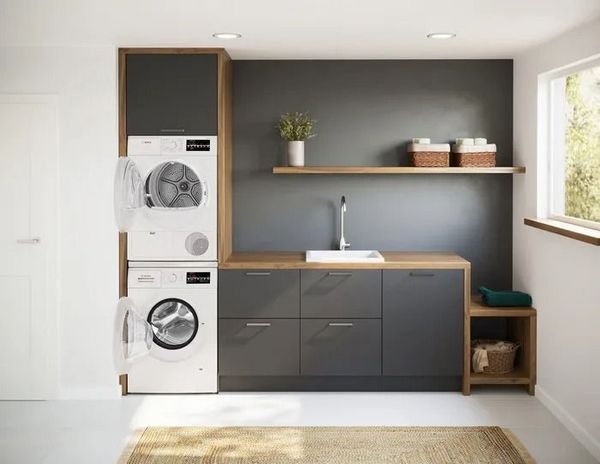
Are you considering a switch? Good call—but there are a few logistics to know about heat pump dryer installation.
- Space requirements: You’ll want adequate room for airflow around the unit.
- Electrical setup: Most use a standard 240V plug, but always check the specs.
- Drainage: Moisture collected during drying is either pumped to a drain or into a reservoir you’ll need to empty.
- Maintenance: Clean the filters and condenser coils regularly to keep things running efficiently.
- Noise & heat: These units run quietly, but if installed in a tiny, unventilated room, they can slightly increase humidity.
Who Should (and Shouldn’t) Buy a Heat Pump Dryer
So, are heat pump dryers worth it? For many—yes. But they’re not for everyone.
Best For:
- Energy-conscious households trying to cut utility costs
- Apartment dwellers or homes without venting
- People with delicate clothes like wool or silk
- Eco-minded shoppers who want to reduce their carbon footprint
- Smaller families or households that don’t do back-to-back laundry marathons
Not Ideal For:
- Large families who need multiple quick cycles in a day
- Bargain hunters who can’t swing the upfront cost
- Anyone who values speed above all else
Bonus: Many states offer rebates for energy-efficient appliances. Be sure to check with your local utility or state energy office.
➜ Learn More: Are Electrolux Dryers Any Good?
Top Heat Pump Dryer Picks You Can Buy Today
All these are ventless heat pump dryer models, and they are available now from East Coast Appliance. We’ve picked the best based on performance, features, and customer satisfaction.
LG 4.2 Cu. Ft. White Front Load Ventless Electric Dryer
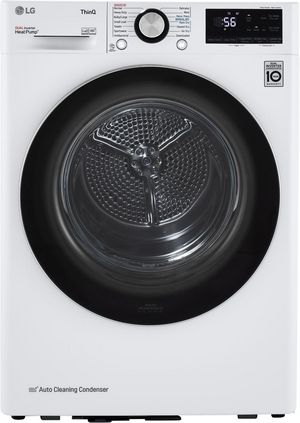
Shop LG 4.2 Cu. Ft. Front Load Ventless Electric Dryer
This compact ventless heat pump dryer is ideal for smaller homes or apartments. Despite its 4.2 cu. ft. capacity, it effortlessly manages regular loads.
The sensor dry system adjusts drying time automatically, and it plugs into a standard 120V outlet. Estimated annual energy cost: $33. This system works best for compact spaces.
Despite its smaller size, it offers big features like LoDecibel™ quiet operation and Smart Diagnosis, which allows for remote troubleshooting. It’s a perfect match for stacked or under-counter installations.
The unit is also ENERGY STAR® certified, keeping your electric bills in check. LG’s clean white finish and minimalist control panel make it blend easily into any modern laundry space.
Best Features
- Sensor Dry
- Smart Diagnosis
- LoDecibel™ Quiet Operation
LG 7.8 Cu. Ft. White Ventless Electric Dryer
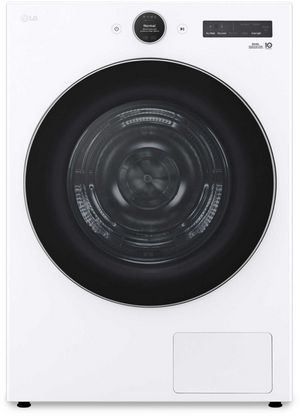
Shop LG 7.8 Cu. Ft. White Ventless Electric Dryer
Need a heat pump dryer for a large household? This LG model combines a 7.8 cu. ft. capacity with built-in Wi-Fi, allowing remote start and monitoring via app.
The TurboSteam option reduces wrinkles and odors fast. Energy cost hovers around $38 annually.
It’s a true powerhouse, with AI technology that can sense fabric texture and adjust cycle settings accordingly. Plus, the ThinQ® app lets you receive maintenance alerts, check cycle status, and even download specialty cycles.
The ENERGY STAR® rating ensures top-tier performance with less energy use. For larger families or tech-savvy users, this one checks every box.
Best Features
- TurboSteam
- ThinQ® Smart Technology
- ENERGY STAR® Certified
Bosch 500 Series 4.0 Cu. Ft. White Front Load Ventless Electric Dryer
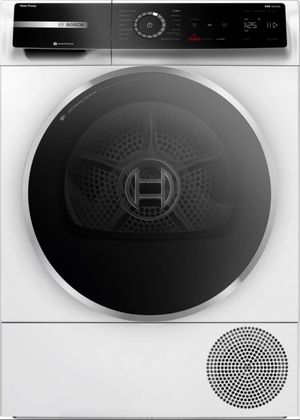
Shop Bosch 4.0 Cu. Ft. Front Load Ventless Electric Dryer
This Bosch ventless dryer is European-designed and ideal for condos or townhomes. The 4.0 cu. ft. drum is smaller but effective, with a self-cleaning condenser and sensitive drying system for fabric care.
Quiet operation and moisture sensors make it best for eco-minded city living. Its compact footprint fits easily in closets or under counters without sacrificing performance. The AntiVibration™ sidewalls reduce noise and provide stability, even during high-speed spin cycles.
Bosch’s Sensitive Drying System dries clothes with warm, mild air from all sides, reducing fabric wear. Bonus: the self-cleaning condenser saves you time and effort.
Best Features
- Self-Cleaning Condenser
- Sensitive Drying System
- AntiVibration design
Samsung 7.5 Cu. Ft. White Ventless Electric Dryer
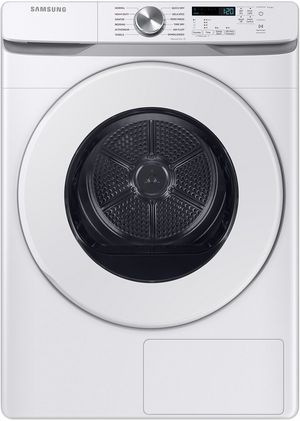
Shop Samsung 7.5 Cu. Ft. Ventless Electric Dryer
Samsung’s 7.5 cu. ft. dryer delivers sleek looks and smart features at a mid-range price. It features Smart Care diagnostics, a reversible door, and Sensor Dry technology.
With a $42 estimated annual energy cost, it’s best for tech lovers who want intuitive control. What sets this model apart is its large capacity without a massive footprint. The drum light makes unloading easier, and the lint filter indicator lets you know exactly when it’s time to clean.
It's eight preset cycles cover everything from bedding to delicates. The clean digital display panel gives this Samsung dryer a modern, minimalist appeal.
Best Features
- Smart Care
- Reversible Door
- Sensor Dry
Miele T1 4.0 Cu. Ft. White Edition Lotus White Ventless Dryer
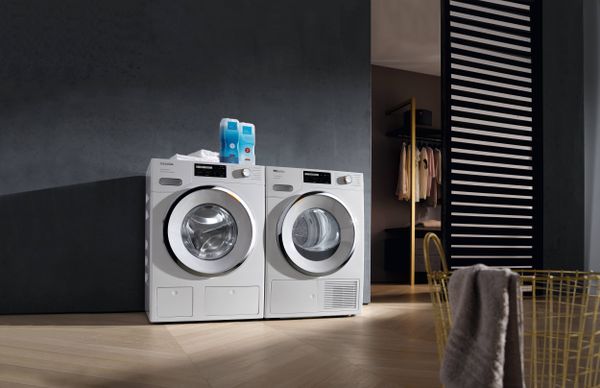
Shop Miele T1 4.0 Cu. Ft. Lotus White Ventless Dryer
Luxury meets function in this Miele ventless dryer. It features a 4.0 cu. ft. capacity, FragranceDos scent capsules, and PerfectDry moisture sensing for precision. Energy cost is just $28 annually lowest on the list. Best for premium performance seekers.
What makes the T1 unique is its Honeycomb drum, which cushions your clothes and reduces pilling and wear. Miele’s WiFiConn@ct feature allows remote operation and monitoring, syncing perfectly with your smart home setup.
The mineral sensors detect calcium in water to ensure optimal drying performance every time. This dryer is built to last with Miele's famously high manufacturing standards.
Best Features
- FragranceDos
- PerfectDry System
- WiFiConn@ct
Heat Pump Dryers: Smart Upgrade or Slow Spin Cycle?
So—are heat pump dryers worth it? If you're looking to save on energy, protect your clothes, and go vent-free, absolutely. The longer dry time is a tradeoff, but with rebates and long-term savings, it often pays off.
Still on the fence? Come visit an East Coast Appliance showroom, explore electric dryer options online, or chat with one of our experts to find the right fit.
Frequently Asked Questions
Depending on usage, you could save up to $60–$80 annually in electricity compared to a vented dryer.
There's no requirement for a vent. Most models just need a 240V outlet and a way to drain moisture or empty a reservoir.
Expect a cycle to run 90–120 minutes, versus 40–60 minutes on a vented model.
Yes, the lower drying temperatures are gentler and safer for delicate fabrics like silk, wool, and synthetics.
Clean the lint filter every load, wipe the moisture sensor monthly, and rinse the condenser coil periodically if it’s not self-cleaning.
Why Trust East Coast Appliance?
Locally owned and operated since 1988, East Coast Appliance is the largest independent appliance dealer in Virginia. We sell it ALL — from new name-brand appliances to scratch-and-dent appliances to our very own refurbished appliances. Aside from our huge selection of every major brand and everyday low prices, what sets us apart from our competitors is that we service what we sell and that we are locally owned and operated with factory-trained associates. And if you’re a local, great news: East Coast Appliance is committed to providing the absolute lowest prices on the same available brand and model — simply bring in the ad of the local retail competitor while the lower price is in effect, and you'll receive your price match.
Shop Heat Pump Dryers at East Coast
There is a reason we are dubbed “The Discount King” — for unbeatable deals, shop laundry appliances online at East Coast Appliance. Our friendly associates are always happy to help you find the best heat pump dryer for your home, whether you call us or use our online chat feature. Better yet, stop by one of our showrooms to see why we are the best appliance store in Virginia. Visit us today!


